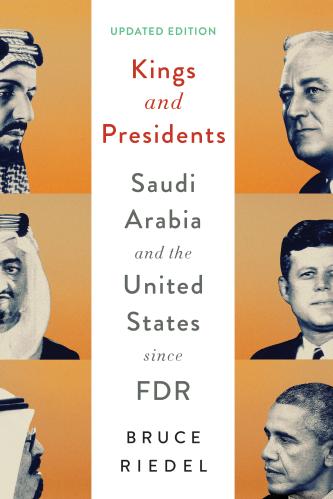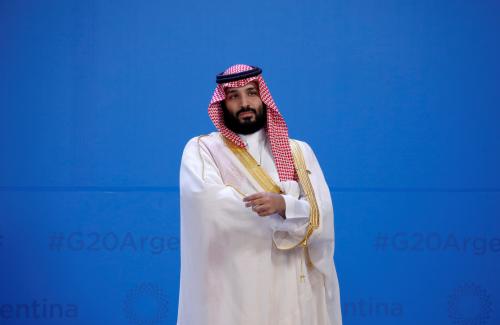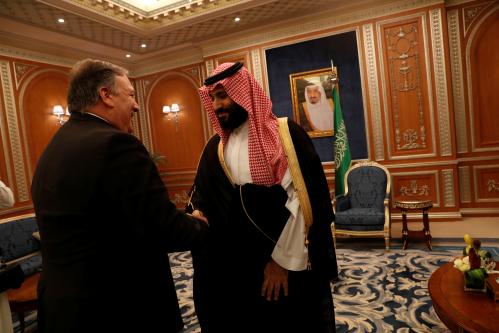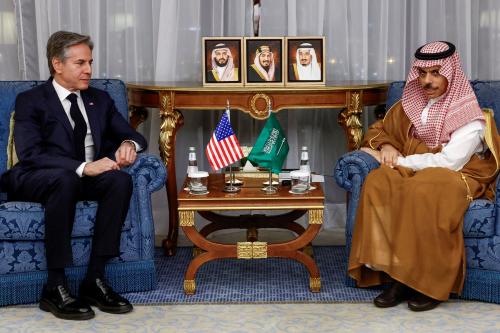The United Nations Special Rapporteur Agnes Callamard has delivered a scathing report on the premeditated murder of Saudi journalist Jamal Khashoggi last October in the Saudi consulate in Istanbul. She recommends that all states impose sanctions on the Saudis involved in the killing, specifically including Crown Prince Muhammad bin Salman. It’s long past time for the Trump administration to come clean about what it knows about the murder and the crown prince. King Salman should also get more scrutiny.
The Saudis immediately labeled the rapporteur’s report as nothing new, the latest in their pathetic attempts to cover up the murder as a “rogue” operation. The report instead documents how the Saudi embassy in Washington specifically told Khashoggi that he must travel to Turkey to get documents for his impending wedding, that once he showed up at the consulate, Riyadh ordered the consul general to send two security officers to the kingdom for “top secret” instructions and then dispatched a Special Operations team to Istanbul to deal with Khashoggi.
The team had 15 members, more than half of them associated with the crown prince and his office. According to the report, “the fact that a team was put together and operational within 48 hours tends to point to a ‘Special Operation’ scenario, with core team members already appointed and in place, ready to act whenever the order comes.” This conclusion suggests that the kingdom has been using such teams for special missions to silence dissent for some time; they knew exactly what it was doing and were experienced at it. It also means that the Saudi state bears full responsibility for the actions of its personnel.
The inclusion in the team sent to Istanbul of both a specialist in dissecting a body and a look-alike to pose as Khashoggi with a false beard is powerful evidence that the team had orders from the highest level in the Saudi government to murder him and dispose of his body while pretending that he had left the consulate. The whole caper “was the result of a planned and elaborate mission involving extensive coordination and resources.”
The report criticizes both the Saudi and Turkish governments for a botched investigation of the murder. The Saudis sent another team after the murder to remove the forensic evidence. The Turks should have done more to interrogate key players, including the consul general. The investigation will never be final without the recovery of the body’s remains. That would require the Saudis’ cooperation.
Like virtually all the investigations of the murder, the rapporteur does not ask the question: What did the king know, and when did he know it? Too many observers paint King Salman as a befuddled old man not in charge. The evidence does not support a simple explanation like that. In fact, the king travels abroad and functions effectively. He just hosted three important summits back-to-back in Mecca and was fully involved. He does delegate enormous power to his favorite son Muhammed bin Salman, but he is also a player especially on issues (like Jerusalem) close to his heart. The presumption of his non-involvement in at least the cover-up of the murder is silly.
The key recommendations of the report includes a call for U.N. members to “impose targeted sanctions against individuals allegedly involved in the killing of Mr. Khashoggi. These should include the Crown Prince of Saudi Arabia, focusing on his personal assets abroad, until and unless evidence has been produced that he bears no responsibility for the execution of Mr. Khashoggi.” This is an extraordinary recommendation for a international report.
It should also be a wake-up call to the administration and the Congress to take a serious look at this crime committed against a resident of Virginia working for the Washington Post. The CIA did not cooperate with the U.N. investigation, according to U.N. sources, undoubtedly because the White House doesn’t want to upset the crown prince. That leaves it to Capitol Hill.
The rapporteur also recommends applying universal jurisdiction for the perpetrators of the murder. In practice, it is unlikely that countries will indict the heir to the throne of Saudi Arabia, but human rights groups are likely to hound the crown prince anytime he tries to travel to a democratic country with lawsuits and demonstrations. His younger brother Khaled has already been so tainted by the crime that he lost his job as ambassador to Washington. His replacement—an excellent choice, Reema bint Bandar—has not shown up yet in Washington, months later.
The Khashoggi affair is going to haunt the Saudis indefinitely for years to come. The royal family needs to think carefully about how to proceed, and the kingdom’s friends need to offer honest and tough advice.
The Brookings Institution is committed to quality, independence, and impact.
We are supported by a diverse array of funders. In line with our values and policies, each Brookings publication represents the sole views of its author(s).








Commentary
U.N. report firmly blames Saudi Arabia for the murder of Jamal Khashoggi
June 19, 2019